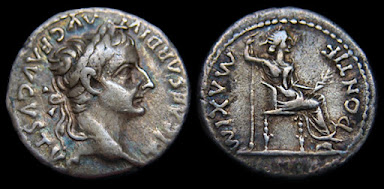II: Caesar’s Denarius
Mark xii. 13-17; Matt. xxii. 15-22; Luke xx. 20-26.
The Sanhedrin's ambassage had not lingered to hear the end of this Parable; they had withdrawn, despairing of conquering the Christ by their own efforts, but more than ever ardently bent upon rallying other enemies against Him. They proceeded at once to take counsel, and, as their fear of the Nazarene outweighed every other feeling, they decided to renew the alliance heretofore made in Galilee, and accordingly courted the cooperation of such Herodians as they encountered in the Temple. Intense as was the aversion usually shown by the Pharisees for these courtiers of the Roman power, they did not scruple at this juncture to make them the instrument of their wily designs.
Now the plan in view was to ask Jesus some question the answer to which, however it might be stated, should involve His ruin. If put to Him by the Zealots of the Law any such insidious demand would be likely to awaken the suspicions of the Christ, and by this time His foes knew him well enough to expect that, with a word, He would snap the snares wherewith they wished to entangle Him. But, on the contrary, when conversing with the Herodians, was there not good reason to hope that the young Rabbi, no longer on His guard, would fall into the trap? However, dreading lest these courtiers should become engaged in any discussion with Him (for thus, as they were unaccustomed to religious controversies, their new allies might be easily confounded), the Sanhedrin at the same time commissioned to attend them some of their own disciples who are not so well known as the headmen of the Synagogue, but were nonetheless experts in the guile. The part the Herodians were to play in this odious comedy was to counterfeit the actions of honest, upright men, coming forward as if anxious to know the truth, and so lie in wait for an opportune instant to surprise the Lord.
At the propitious season (so it seemed) the Herodians probably pretended to be engaged in an argument among themselves; then approach Jesus, praying that he would arbitrate between them.
"Master," they began, with great demonstrations of reverence, "we know that you are true-spoken, and that you do not put yourself out for anyone, whoever he may be; for you have no respect for the person of men, but teach the way of God in all sincerity. Is it lawful for us to pay tribute to Caesar or not?"
It seemed impossible for Jesus to escape them this time. To condemn the tribute would be to run the risk of incurring the vengeance of the Rome; to accounted legitimate would be to infuriate the Jews, who would construe it is a bit of flattery intended to conciliate these Gentiles. Clearly seeing the ambush, the Master turned toward the Scribes.
"Hypocrites," He said, " why do you tempt Me? Bring me the coin with which you pay the tribute."
 |
| "Is it lawful for us to pay tribute to Caesar or not?" J-J Tissot. |
Not one among the Zealots of the Law could keep in his purse a piece of metal stamped with idolatrous emblems; it was necessary, therefore, to procure one from the neighbouring money-changers, or from someone in the crowd. It so fell out that the piece presented to the Lord was not the peculiar coin which the Romans had authorised four Judaea,— which bore the name without the image of the Emperor,— but a real Roman Denarius. On one side Jesus displayed to the Pharisees the figure of Tiberius with the exergue: TIBERIUS CAESAR, SON OF THE DIVINE AUGUSTUS. [1]
[1] TI. CAESAR. DIVI. AUG. F. AUGUSTUS. On the reverse is a woman seated, and these words: PONTIF. [EX] MAXIM. [US]
 |
| Caesar's Tribute. DrusMAX / CC BY-SA |
"Whose is this image and this inscription?" The Lord demanded of them.
"Caesar's," they said.
This answer contained their condemnation, for, following the teaching of their foremost Rabbis, to accept the money of a sovereign was to acknowledge his power. Now the Pharisees made use of Caesar's money in all matters of contract and commerce. By what right, after reaping the advantages of imperial protection, could they refuse to meet the common cost, and to pay what they owed according to strict justice?
"Render to Caesar that which is Caesar's," added Jesus, "and to God that which is Gods."
This decision determined what falls to Caesar's share and what is God's. To the princes of the earth belong obedience and tribute; the soul belongs to God.
This left the Pharisees hopeless of either ensnaring the Christ in His talk or exciting the hatred of the mob against Him; they retired in confusion. Three days later they recalled this scene in Pilate's Praetorium, but only to travesty His words by their calumny:—
" We found this fellow," they then said, "forbidding the people to pay tribute to Caesar."
No comments:
Post a Comment